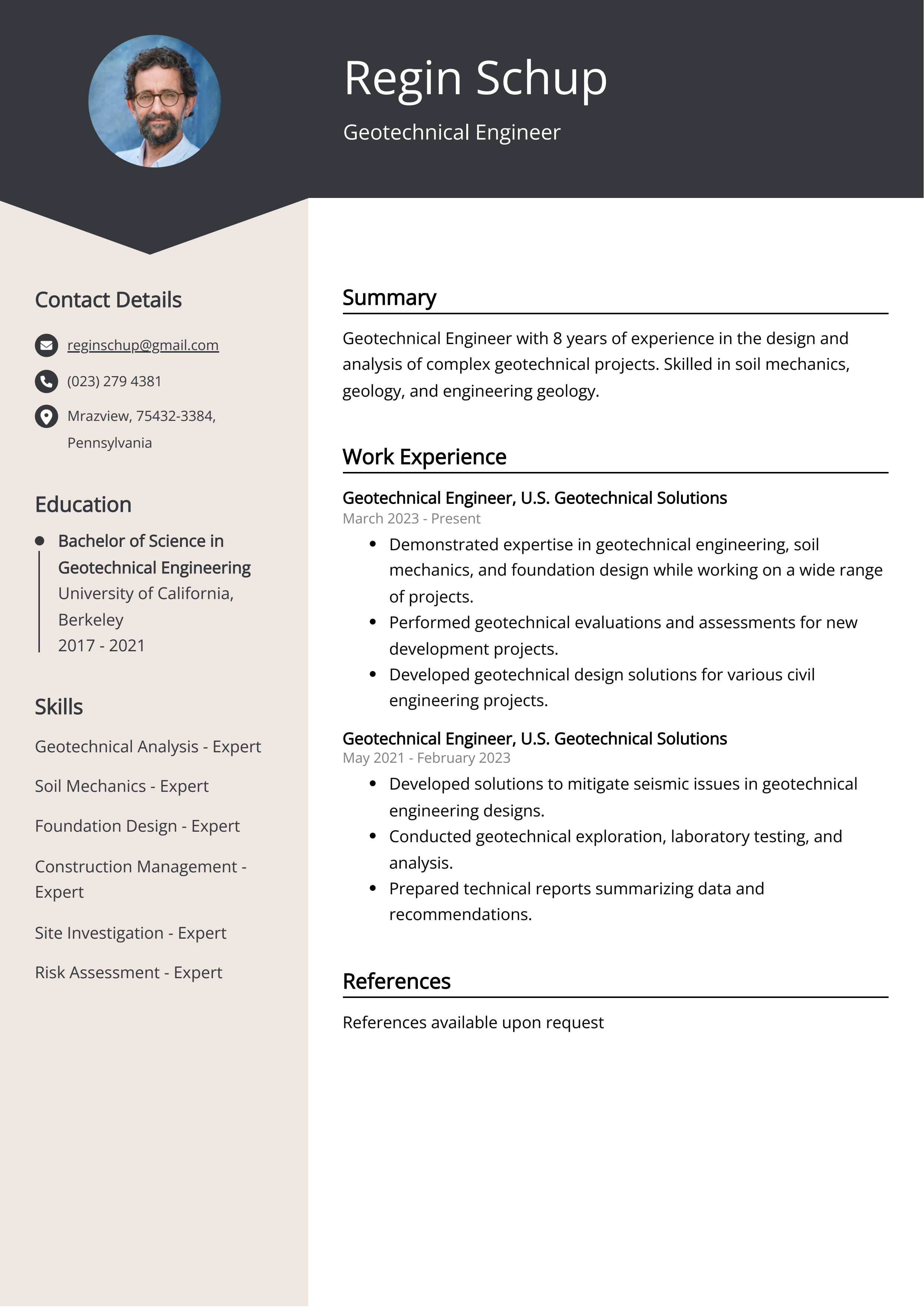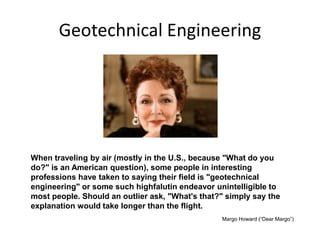Examine This Report on Geotheta
Facts About Geotheta Uncovered
Table of ContentsThe Definitive Guide to GeothetaLittle Known Facts About Geotheta.Geotheta for DummiesFascination About GeothetaWhat Does Geotheta Mean?

They carry out website investigations, accumulate examples, do research laboratory tests, and examine information to evaluate the viability of the ground for building jobs - Consulting Engineers. Based upon their findings, geotechnical designers offer recommendations for structure layout, incline stability, keeping frameworks, and reduction of geotechnical hazards. They team up with various other experts, such as designers, structural engineers, and construction teams, to ensure that geotechnical considerations are incorporated right into the total task layout and application
By evaluating the habits and properties of soil and rock, they can recognize potential geotechnical hazards such as landslides, dirt settlement, or slope instability. Their experience assists prevent failings or crashes that might endanger lives and property. Right here are some in-depth obligations and duties of a geotechnical designer: Site Examination: Geotechnical designers conduct website investigations to collect data on subsurface conditions.
They analyze the information to understand the homes and actions of the soil and rock, including their strength, leaks in the structure, compaction characteristics, and groundwater problems. Geotechnical Evaluation and Design: Geotechnical engineers evaluate the information gathered throughout website investigations to assess the stability and suitability of the website for construction projects. They carry out geotechnical computations and modeling to review elements such as birthing ability, settlement, incline stability, lateral earth stress, and groundwater circulation.
Geotheta for Dummies
Structure Layout: Geotechnical designers play a vital duty in designing structures that can securely sustain the intended structure. They assess the dirt conditions and load requirements to figure out the appropriate foundation type, such as superficial structures (e.g., grounds), deep foundations (e.g (https://allmyfaves.com/geotheta?tab=Geotheta)., piles), or specialized methods like soil improvement. They take into consideration aspects such as settlement restrictions, birthing capacity, and soil-structure interaction to establish ideal foundation styles
They review building and construction strategies, display site activities, and perform field examinations to validate that the design suggestions are complied with. If unanticipated geotechnical concerns emerge, they assess the situation and give referrals for removal or changes to the design. Risk Evaluation and Reduction: Geotechnical designers examine geotechnical dangers and risks associated with the project website, such as landslides, liquefaction, or dirt erosion.

Collaboration and Communication: Geotechnical designers function closely with various other specialists involved in a task, such as engineers, structural designers, and building groups. Reliable communication and partnership are vital to incorporate geotechnical factors to consider right into the total job style and building process. Geotechnical designers offer technological know-how, solution queries, and ensure that geotechnical requirements are satisfied.
Geotheta for Beginners
Here are some kinds of geotechnical engineers: Foundation Designer: Foundation designers focus on making and analyzing structures for structures. They evaluate the dirt conditions, load demands, and site attributes to identify the most suitable foundation kind and style, such as shallow structures, deep foundations, or specialized strategies like stack foundations.
They assess the elements influencing incline stability, such as soil buildings, groundwater conditions, and incline geometry, and develop methods to stop slope failings and minimize threats. Quake Engineer: Earthquake engineers focus on assessing and developing frameworks to withstand seismic forces. They examine the seismic threat of a site, evaluate dirt liquefaction capacity, and establish seismic read the article design standards to make certain the safety and security and strength of frameworks throughout earthquakes.
They execute field testing, collect samples, and evaluate the accumulated information to identify the dirt homes, geologic developments, and groundwater problems at a site. Geotechnical Instrumentation Designer: Geotechnical instrumentation designers concentrate on tracking and measuring the behavior of soil, rock, and frameworks. They install and maintain instrumentation systems that monitor variables such as dirt settlement, groundwater levels, incline movements, and structural variations to assess efficiency and supply early cautions of prospective issues.
How Geotheta can Save You Time, Stress, and Money.
They conduct examinations such as triaxial tests, consolidation tests, direct shear examinations, and leaks in the structure tests to collect data for geotechnical analysis and style. Geosynthetics Engineer: Geosynthetics designers concentrate on the style and application of geosynthetic materials, such as geotextiles, geogrids, and geomembranes. They utilize these products to enhance soil stability, reinforce slopes, provide drainage solutions, and control disintegration.
They tend to be investigative people, which implies they're intellectual, introspective, and analytical. They are curious, methodical, rational, logical, and rational. Some of them are likewise social, indicating they're kind, generous, cooperative, person, caring, valuable, understanding, tactful, and pleasant - Geotechnical Engineers.
In the office environment, geotechnical designers make use of specialized software application tools to perform estimations, develop styles, and evaluate data. They prepare records, evaluation project specs, connect with clients and group participants, and coordinate project activities. The office setup offers a conducive setting for research study, evaluation, and partnership with various other specialists associated with the task.
The Facts About Geotheta Revealed
They often go to project websites to conduct site investigations, assess geotechnical problems, and collect information for analysis. These gos to involve traveling to different areas, sometimes in remote or difficult terrains. Geotechnical engineers may execute soil sampling, conduct examinations, and monitor building activities to make sure that the geotechnical aspects of the task are being applied appropriately.
Geotechnical engineers also operate in specialized geotechnical research laboratories. In these facilities, they conduct experiments, perform examinations on soil and rock samples, and examine the design residential or commercial properties of the products. Geotechnical lab engineers function extensively in these environments, managing screening devices, operating instruments, and taping data. They collaborate with various other lab staff to guarantee precise and trusted screening outcomes.